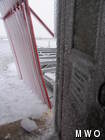Ice
2010-11-09 15:10:16.000 – Steve Welsh, IT Observer
NULL
Ice, ice everywhere.
After two days of freezing rain, drizzle and fog, plus ice pellets thrown in for good measure, everything outside is coated in glaze ice. This goes for the building, antennas, weather instruments and even the observers and interns if they stay out for more than a few minutes at a time.
Slowly but surely we have been losing contact with our remote weather sites as their antennas and solar panels get coated in ice. There’s nothing quite like glaze ice for reducing radio power and the thick undercast over the weekend didn’t help either as the clouds prevented the solar panels from charging their batteries fully. This is why the ARVP and Mesonet web pages have only been updating sporadically at best.
Each remote site also contains a logger, which records all the data locally and requires very little power to operate. So once the sun comes out again and charges up the batteries and clears the ice off the antennas we should be able to re-establish communications and pull over all the data.
The latest weather models are showing a large high pressure system starting to build in and we should be clearing out of the freezing fog later tonight. The sun will be out tomorrow and temperatures will climb above freezing point so hopefully all this ice will melt away and everything will be back to normal once again.
Steve Welsh, IT Observer
Team Flags Return for Seek the Peak’s 25th Anniversary
Team Flags Return for Seek the Peak's 25th Anniversary By MWOBS Staff Mount Washington Observatory is looking forward to continuing a much-loved tradition for Seek the Peak’s 25th Anniversary: Team flags. In inviting teams
Meet Summer Interns Zakiya, Max and Maddie
Meet Summer Interns Zakiya, Max and Maddie By MWOBS Staff We are excited to welcome six teammates to the summit of Mount Washington this summer! During their internship, these students and graduates will play
Saying Goodbye to the Summit
Saying Goodbye to the Summit By Alexis George After an extraordinary last three years working as a Weather Observer and Meteorologist, I am excited to pursue a different career. As sad I as am






